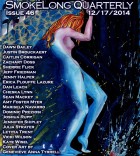You’re working on a novel, a full-length story collection, a couple of screenplay adaptations, and yet, still manage to come out with a flash blazing in the pocket. How do you do it all, and juggle your many projects?
Well, I juggle at a snail’s pace, or at least that’s how it seems. I’m a quick first drafter but an incredibly slow reviser. I can spend hours trying to get a paragraph right. I also – since I have a tendency to generate more than I can realistically revise – have a lot of notebooks filled with drafts that I’m reluctant to get rid of, but at some point they are going to become a fire hazard. In terms of process, in a perfect world, I try to write a few pages a day regardless of the form.
Do you ever get stuck? If so, how do you become unstuck?
Sometimes I think the only way to become unstuck is to step away. I’ve had so many projects – all forms – where I’m just living in this enormous vat of confusion and uncertainty, but most of the time, if I start plugging along on something else, I’ll figure out the thing I was stuck on. Music also helps, a lot – sometimes the most random, unconnected song can jolt me back into a piece. Who Knows Where the Time Goes was really helpful with a story recently. And Video Killed the Radio Star. And the soundtrack for Beasts of the Southern Wild. I have enormous playlists. Also writing longhand helps – sometimes I’ll put a timer on and focus for sprints of twenty minutes or so. But for some reason most of the successful flash pieces I’ve written have been composed on some form of public transportation.
There is a beautiful cinematic quality to this story. I can picture this girl, this guy, this bodega, the fraught moment between them. Do you find your writing influenced by your full-time career in film development?
Thank you – that is very nice of you! I think the cinematic quality comes more from living in the city and being quite taken with the images around me. I usually have a line or an image in my head when I start a story and I’m usually not sure where it is going. If there’s anything my job has taught me, it’s the importance of a really solid story. I read a lot of scripts, and screenwriters don’t have the luxury fiction writers do – you don’t have access to inner life in any way. It’s all about what happens. This seems so obvious. I’m still learning how to apply this to my own work – how to wrestle drafts into compelling narratives.
How did this story come together? What was the spark? Why did you choose to go with flash here instead of longer form fiction?
There was a line in my head about one identity overtaking another, and an image of this young girl in really ragged stockings sitting on a wet curb. While I was jotting it down, I thought of the last line – a kiss that wasn’t really a kiss. I have a bizarre obsession with 7-11s. The story was sort of over before it started, the loop of a moment in time. Writing a flash feels like an enormous exhale when it’s going well, it has a speed and finality other forms don’t. But with all fiction, I’m particularly drawn to the freedom to make a universe exactly as you want it. This story is fairly realistic but lately I’ve been drawn to the near future, to imagining the world as it might one day be, which is frightening and thrilling too.
Your fiction often dwells in the fertile playground of youth, particularly with characters that seem to be tittering on some kind of metaphoric seesaw. The unnamed girl in your story here exemplifies this – she is a child trying on the costume of a rebellious, more sophisticated teenager. What is it about this age that makes it so integral to your work?
I think because I am still stuck way back when. I wish I had a better answer! I hope I outgrow it soon. There’s a narrator in a longer work I’m in the midst of who is an actual adult, and I’ve been enjoying writing her.
The mentor relationship is indispensable to many writers. Do you have a mentor? How does the writing community feed your work?
Mentors are so important to me – it’s embarrassing to list the many writers and teachers I admire here because I’m outing myself as a workshop junkie, but here are two on different ends of the spectrum – in grad school, I took a screenwriting class with Christopher Keane and really started to understand story and structure, so even though I didn’t study fiction with him, he was hugely influential. And a couple years ago I took a class with Lore Segal, who has a spirit that I find incredibly inspiring – she’s really a national treasure, as a writer and a human being. I’ve met some of my best friends and writing buddies in workshop; deadlines from friends and mentors are probably the only reason I ever finish anything. Beyond the writing community I’m in a group that meets once a week called HIVE – there are five of us, a director, two actors, and a cinematographer, and we set career goals for ourselves and for each other. Describing how important this group is to me is sort of like writing a message to a close friend in a birthday card – I find it almost impossible.
How do you know when a story is done?
This is a very good question. I do love finishing a draft of a story on a line I didn’t expect to land on. Sometimes I think a story is done way before it is, and since I know I have this tendency, often I’ll put a piece of work aside for a period of time so I can go back to it with fresh eyes.


